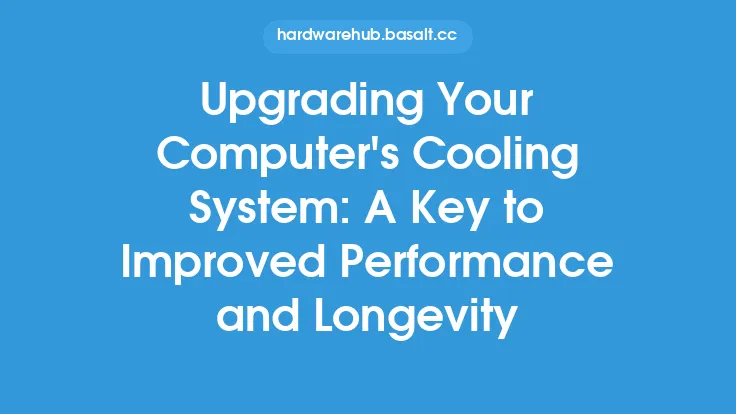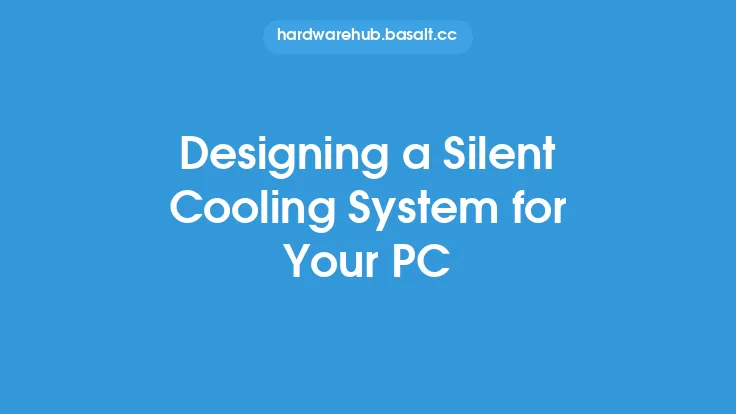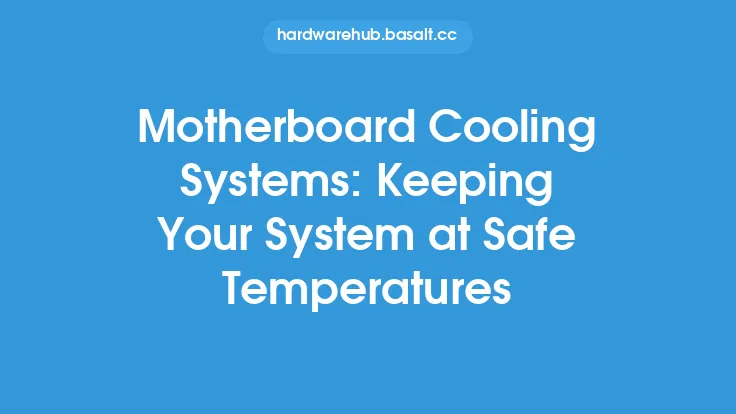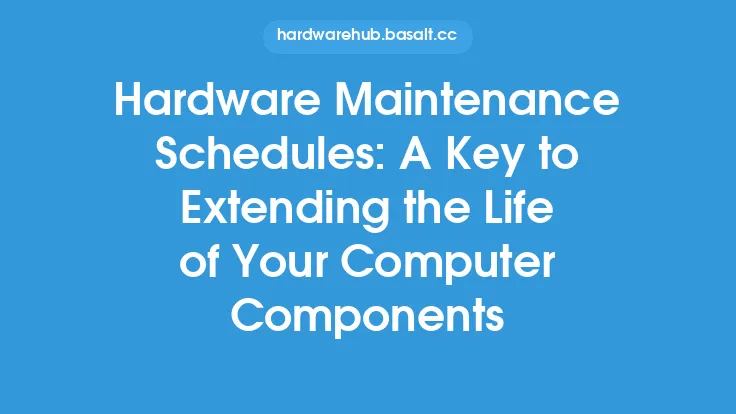Proper maintenance of a computer's cooling system is essential for ensuring reliable operation and preventing damage to the hardware. The cooling system plays a critical role in regulating the temperature of the computer's components, such as the central processing unit (CPU), graphics processing unit (GPU), and memory. If the cooling system is not functioning correctly, it can lead to overheating, which can cause damage to the components, slow down the system, and even lead to system crashes.
Introduction to Cooling Systems
A computer's cooling system typically consists of a combination of air and liquid cooling components. The air cooling components include fans, heat sinks, and vents, which work together to dissipate heat from the components. The liquid cooling components, on the other hand, use a liquid coolant to absorb heat from the components and transfer it to a radiator, where it is dissipated. The choice of cooling system depends on the specific needs of the computer, including the type of components, the power consumption, and the operating environment.
Components of a Cooling System
The components of a cooling system include:
- Fans: These are used to circulate air through the computer case and dissipate heat from the components. There are different types of fans, including axial fans, centrifugal fans, and blower fans, each with its own unique characteristics and applications.
- Heat sinks: These are used to absorb heat from the components and transfer it to the air. Heat sinks are typically made of a metal with high thermal conductivity, such as copper or aluminum, and are designed to maximize the surface area in contact with the air.
- Vents: These are used to provide a path for the air to flow through the computer case and dissipate heat from the components. Vents can be located at the front, rear, or top of the case, depending on the design of the cooling system.
- Radiators: These are used in liquid cooling systems to dissipate heat from the liquid coolant. Radiators are typically made of a metal with high thermal conductivity, such as copper or aluminum, and are designed to maximize the surface area in contact with the air.
- Liquid coolant: This is used in liquid cooling systems to absorb heat from the components and transfer it to the radiator. The liquid coolant is typically a mixture of water and a corrosion inhibitor, and is designed to have a high thermal conductivity and a low viscosity.
Maintenance Tasks
To ensure reliable operation of the cooling system, it is essential to perform regular maintenance tasks. These tasks include:
- Cleaning the fans and heat sinks: This involves removing dust and debris from the fans and heat sinks, which can accumulate over time and reduce their effectiveness.
- Checking the fans: This involves verifying that the fans are spinning correctly and are not making any unusual noises.
- Checking the heat sinks: This involves verifying that the heat sinks are securely attached to the components and are not blocked by dust or debris.
- Checking the vents: This involves verifying that the vents are not blocked by dust or debris and are providing a clear path for the air to flow through the computer case.
- Checking the radiators: This involves verifying that the radiators are not blocked by dust or debris and are functioning correctly.
- Checking the liquid coolant: This involves verifying that the liquid coolant is at the correct level and is not leaking.
Tools and Materials
To perform the maintenance tasks, you will need a few tools and materials. These include:
- A can of compressed air: This is used to clean the fans and heat sinks.
- A soft brush: This is used to clean the heat sinks and vents.
- A screwdriver: This is used to remove the fans and heat sinks for cleaning.
- A torque wrench: This is used to tighten the screws that hold the heat sinks in place.
- A multimeter: This is used to measure the voltage and current of the fans and pumps.
- A thermal imaging camera: This is used to measure the temperature of the components and identify any hot spots.
Best Practices
To ensure reliable operation of the cooling system, it is essential to follow best practices. These include:
- Keeping the computer case clean and dust-free.
- Ensuring that the fans and heat sinks are properly secured and are not blocked by dust or debris.
- Ensuring that the vents are not blocked by dust or debris and are providing a clear path for the air to flow through the computer case.
- Ensuring that the radiators are not blocked by dust or debris and are functioning correctly.
- Ensuring that the liquid coolant is at the correct level and is not leaking.
- Monitoring the temperature of the components and adjusting the cooling system as needed.
Troubleshooting
If you encounter any issues with the cooling system, it is essential to troubleshoot the problem. This involves identifying the source of the problem and taking corrective action. Some common issues with cooling systems include:
- Overheating: This can be caused by a variety of factors, including a malfunctioning fan, a blocked vent, or a low level of liquid coolant.
- Noise: This can be caused by a malfunctioning fan or a loose heat sink.
- Leaks: This can be caused by a faulty connection or a damaged radiator.
- Corrosion: This can be caused by a faulty connection or a damaged radiator.
Conclusion
In conclusion, maintaining a computer's cooling system is essential for ensuring reliable operation and preventing damage to the hardware. By performing regular maintenance tasks, following best practices, and troubleshooting any issues that arise, you can help ensure that your computer's cooling system is functioning correctly and efficiently. Remember to always follow proper safety procedures when working with electrical components, and to consult the user manual or manufacturer's instructions if you are unsure about any aspect of the maintenance process.





